-
 Bitcoin
Bitcoin $117800
0.49% -
 Ethereum
Ethereum $4432
0.55% -
 XRP
XRP $3.106
1.07% -
 Tether USDt
Tether USDt $1.001
0.01% -
 BNB
BNB $835.8
1.74% -
 Solana
Solana $189.1
2.72% -
 USDC
USDC $0.9999
-0.01% -
 Dogecoin
Dogecoin $0.2302
3.65% -
 TRON
TRON $0.3485
-0.69% -
 Cardano
Cardano $0.9212
-0.91% -
 Hyperliquid
Hyperliquid $46.97
1.45% -
 Chainlink
Chainlink $22.77
5.61% -
 Stellar
Stellar $0.4284
0.82% -
 Sui
Sui $3.766
2.82% -
 Bitcoin Cash
Bitcoin Cash $583.5
-0.82% -
 Ethena USDe
Ethena USDe $1.001
0.03% -
 Hedera
Hedera $0.2512
2.78% -
 Avalanche
Avalanche $24.18
2.27% -
 Litecoin
Litecoin $120.2
2.10% -
 Toncoin
Toncoin $3.450
1.96% -
 UNUS SED LEO
UNUS SED LEO $9.412
-0.92% -
 Shiba Inu
Shiba Inu $0.00001298
2.35% -
 Uniswap
Uniswap $10.99
3.75% -
 Polkadot
Polkadot $3.962
3.09% -
 Dai
Dai $1.000
0.00% -
 Bitget Token
Bitget Token $4.643
1.38% -
 Cronos
Cronos $0.1511
-0.08% -
 Ethena
Ethena $0.7246
3.18% -
 Monero
Monero $254.9
7.90% -
 Pepe
Pepe $0.00001100
3.32%
Is cloud storage of Bitcoin wallets safe?
Cloud Bitcoin wallet storage, while convenient, is risky due to hacking vulnerabilities and potential data loss. Reputable providers and strong security practices mitigate some risks, but hardware wallets remain the most secure option.
Mar 25, 2025 at 03:07 pm
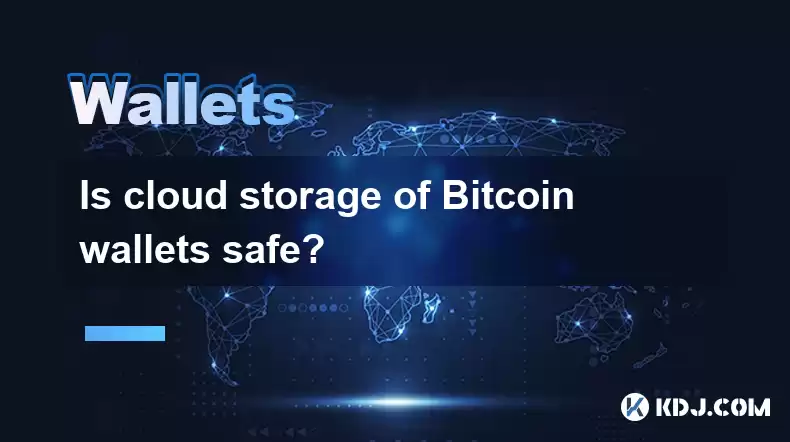
Is Cloud Storage of Bitcoin Wallets Safe?
The question of whether cloud storage for Bitcoin wallets is safe is complex and doesn't have a simple yes or no answer. Security depends heavily on the specific cloud provider, the implementation of the wallet, and the user's own security practices. While convenient, it introduces significant risks compared to hardware or even well-secured software wallets.
One primary concern is the potential for hacking. Cloud service providers, despite robust security measures, are vulnerable to breaches. A successful attack could expose your wallet's private keys, granting the attacker complete control over your Bitcoin. This is a far greater risk than with locally stored wallets, where compromise requires physical access or sophisticated malware.
Another key risk is the potential for data loss due to server failures or provider outages. While reputable cloud services offer redundancy and backups, data loss is still a possibility. Unlike a locally stored wallet, you have no direct control over the backup and recovery process, relying entirely on the provider's infrastructure and policies. This lack of control can be a significant disadvantage.
Furthermore, the legal jurisdiction of the cloud provider can impact your ability to recover your funds in case of disputes or legal issues. If the provider is located in a country with less stringent data protection laws, recovering your Bitcoin might be significantly more difficult or even impossible. This is a crucial factor to consider before entrusting your cryptocurrency to a cloud service.
The security of your wallet also depends on the type of cloud storage used. Simple cloud file storage, where you might store your wallet's seed phrase or private keys as a file, is highly discouraged. This exposes your most sensitive information to potential breaches directly. Specialized cryptocurrency cloud wallets, while potentially more secure, still carry the inherent risks associated with trusting a third party with your private keys.
Let's examine some potential scenarios and best practices:
- Scenario 1: Storing your seed phrase in a cloud document. This is incredibly risky. Anyone gaining access to this document gains access to your entire Bitcoin fortune. Avoid this at all costs.
- Scenario 2: Using a reputable cloud-based Bitcoin wallet provider. This is less risky than direct seed phrase storage but still introduces the risk of a third-party compromise. Choose a provider with a strong security reputation and carefully review their security policies.
- Scenario 3: Using a cloud-based service to back up your locally stored wallet. This is a more acceptable approach. The primary risk here is the potential loss of the backup itself. Ensure the backup is encrypted and stored securely.
To minimize risk, even when using a cloud service for backups, consider these steps:
- Use strong passwords and two-factor authentication (2FA). This adds an extra layer of security, making it harder for unauthorized access.
- Encrypt your wallet backups. Encryption adds an additional layer of protection, even if the backup is compromised.
- Use a reputable and well-established cloud provider. Research providers known for their robust security measures.
- Regularly review your cloud provider's security policies. Stay informed about any changes that might impact the security of your data.
- Consider using a hardware wallet for primary storage. This remains the most secure option for storing your Bitcoin. Cloud storage can be used for backups only, if deemed necessary.
The use of cloud storage for Bitcoin wallets is inherently less secure than local storage methods. While cloud storage can offer convenience for backups, it introduces several significant risks. The responsibility for security ultimately rests with the user.
Frequently Asked Questions:
Q: Is it safer to store my Bitcoin wallet's seed phrase in a password-protected cloud document than on a piece of paper?
A: No. While a password-protected document offers some protection, it is still significantly less secure than hardware wallets or even well-secured software wallets. A determined attacker could potentially gain access to the document, even with a password. Paper, while vulnerable to physical theft or destruction, offers better security than a cloud-based document.
Q: Are all cloud-based Bitcoin wallets equally risky?
A: No. Reputable providers with established security protocols and transparent practices pose a lower risk than lesser-known or poorly-secured services. However, all cloud-based wallets inherently introduce third-party risk.
Q: Can I recover my Bitcoin if my cloud-based wallet provider goes out of business?
A: It depends. If you have access to your seed phrase or private keys, you can recover your Bitcoin using a different wallet. However, if you only rely on the provider's system and lose access to your private keys, recovery may be impossible.
Q: What is the most secure way to store my Bitcoin?
A: The most secure way is to use a hardware wallet. These devices keep your private keys offline, making them extremely resistant to hacking and malware.
Q: If I use a cloud service to back up my local Bitcoin wallet, am I safe?
A: While this is safer than storing your seed phrase directly in the cloud, it still introduces risk. A compromised backup could still lead to the loss of your Bitcoin. Ensure your backup is encrypted and stored securely within the cloud service. Consider using multi-factor authentication and strong passwords.
Disclaimer:info@kdj.com
The information provided is not trading advice. kdj.com does not assume any responsibility for any investments made based on the information provided in this article. Cryptocurrencies are highly volatile and it is highly recommended that you invest with caution after thorough research!
If you believe that the content used on this website infringes your copyright, please contact us immediately (info@kdj.com) and we will delete it promptly.
- Kazakhstan's Crypto Leap: Bitcoin ETF and Central Asia's Digital Finance Future
- 2025-08-13 12:45:19
- BlockDAG Presale Blazes Past $371M: Fundraising Frenzy Fuels Crypto Sensation
- 2025-08-13 13:05:21
- Meme Coins: Chasing the 2025 Surge – Which Will Moonshot?
- 2025-08-13 10:25:23
- Bitcoin's Wild Ride: Rally, Pullback, and What's Next
- 2025-08-13 10:25:23
- Bitcoin, Bitmax, and Institutional Demand: A New Era of Crypto Investment
- 2025-08-13 10:45:12
- Solana, ROAM, and Airdrops: What's the Buzz in 2025?
- 2025-08-13 11:35:13
Related knowledge
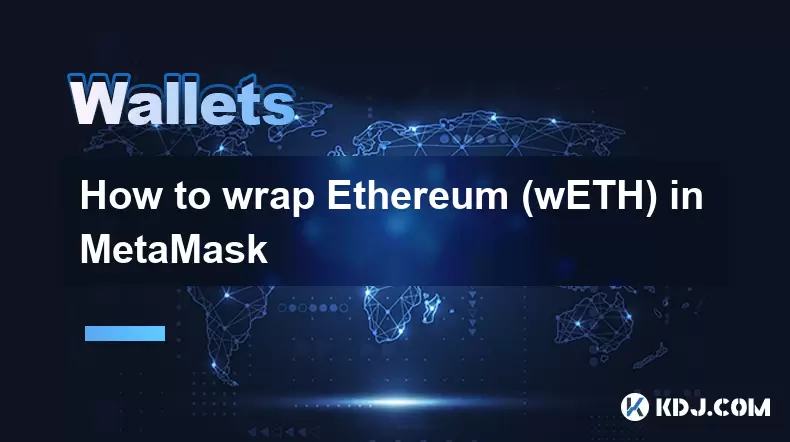
How to wrap Ethereum (wETH) in MetaMask
Aug 13,2025 at 11:36am
Understanding Wrapped Ethereum (wETH)Wrapped Ethereum (wETH) is a tokenized version of native Ethereum (ETH) that conforms to the ERC-20 standard, ena...

How to manage your portfolio in Exodus wallet
Aug 08,2025 at 10:07pm
Understanding the Exodus Wallet InterfaceThe Exodus wallet is a non-custodial cryptocurrency wallet that supports a wide range of digital assets. When...
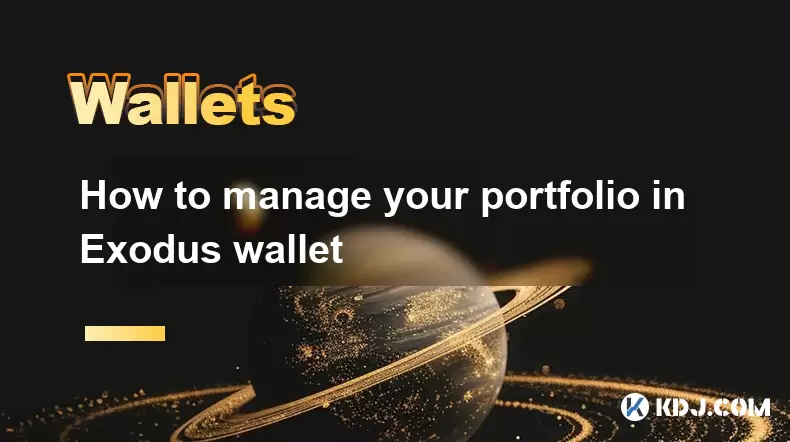
How to manage your portfolio in Exodus wallet
Aug 13,2025 at 11:35am
Understanding the Exodus Wallet InterfaceThe Exodus wallet is a non-custodial cryptocurrency wallet that supports a wide range of digital assets. Upon...

How to reset your MetaMask password
Aug 08,2025 at 01:28pm
Understanding the MetaMask Password Reset ProcessMany users confuse the MetaMask password with the seed phrase or private key, but they serve differen...
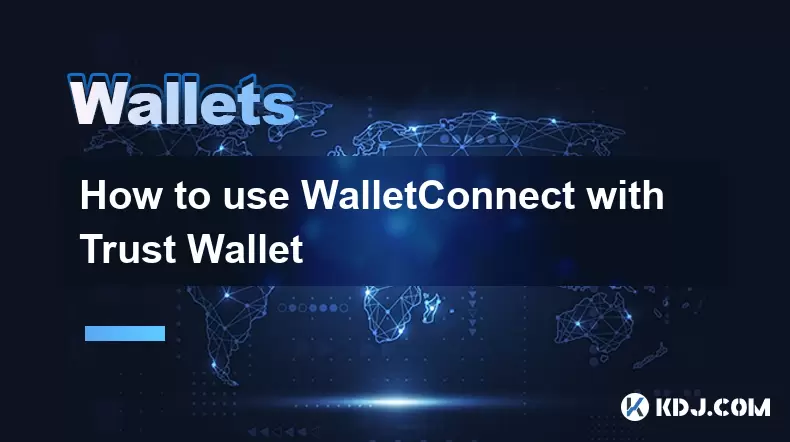
How to use WalletConnect with Trust Wallet
Aug 13,2025 at 01:07am
What Is WalletConnect and Why It Matters for Trust Wallet UsersWalletConnect is an open-source protocol that enables secure communication between dece...
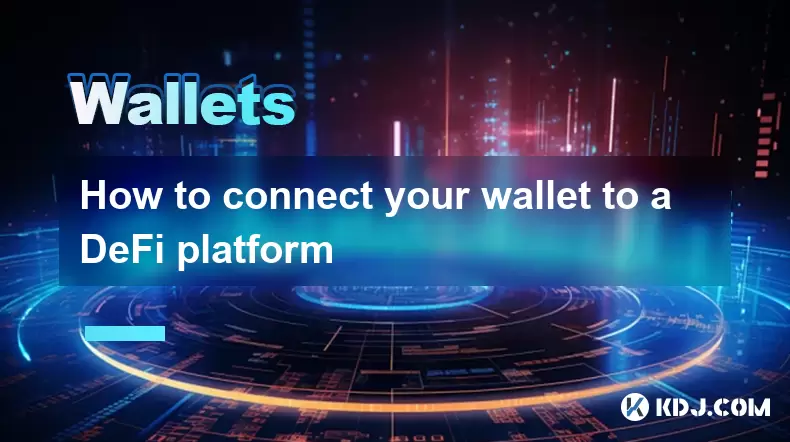
How to connect your wallet to a DeFi platform
Aug 13,2025 at 11:36am
Understanding Wallet Compatibility with DeFi PlatformsBefore connecting your wallet to any DeFi platform, it's essential to ensure your wallet is comp...

How to wrap Ethereum (wETH) in MetaMask
Aug 13,2025 at 11:36am
Understanding Wrapped Ethereum (wETH)Wrapped Ethereum (wETH) is a tokenized version of native Ethereum (ETH) that conforms to the ERC-20 standard, ena...

How to manage your portfolio in Exodus wallet
Aug 08,2025 at 10:07pm
Understanding the Exodus Wallet InterfaceThe Exodus wallet is a non-custodial cryptocurrency wallet that supports a wide range of digital assets. When...

How to manage your portfolio in Exodus wallet
Aug 13,2025 at 11:35am
Understanding the Exodus Wallet InterfaceThe Exodus wallet is a non-custodial cryptocurrency wallet that supports a wide range of digital assets. Upon...

How to reset your MetaMask password
Aug 08,2025 at 01:28pm
Understanding the MetaMask Password Reset ProcessMany users confuse the MetaMask password with the seed phrase or private key, but they serve differen...

How to use WalletConnect with Trust Wallet
Aug 13,2025 at 01:07am
What Is WalletConnect and Why It Matters for Trust Wallet UsersWalletConnect is an open-source protocol that enables secure communication between dece...

How to connect your wallet to a DeFi platform
Aug 13,2025 at 11:36am
Understanding Wallet Compatibility with DeFi PlatformsBefore connecting your wallet to any DeFi platform, it's essential to ensure your wallet is comp...
See all articles

























































































